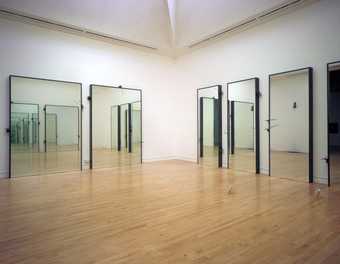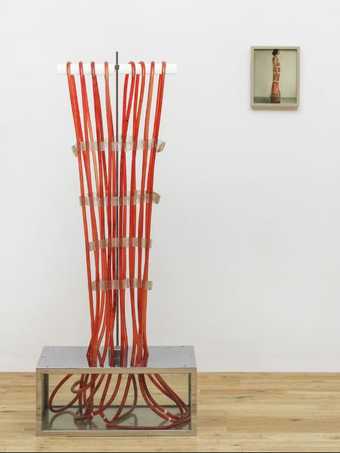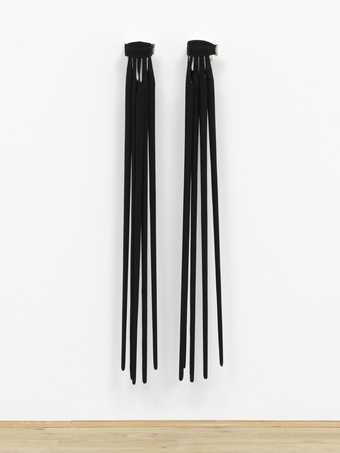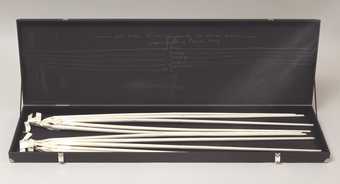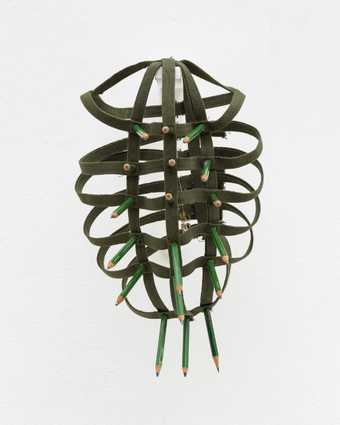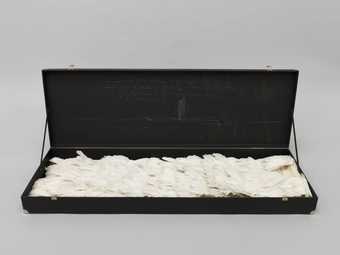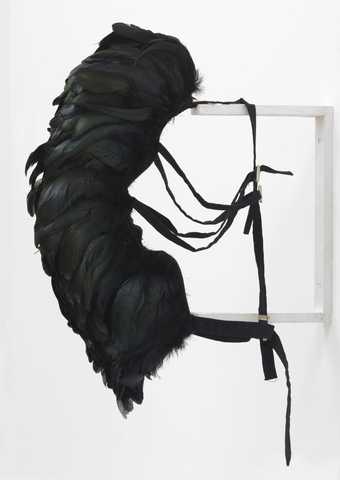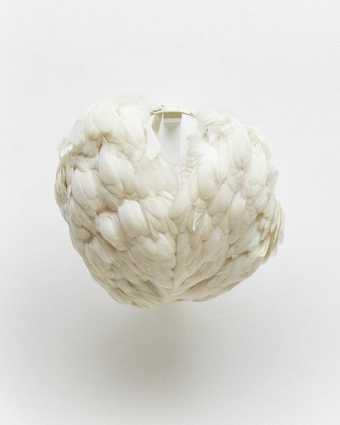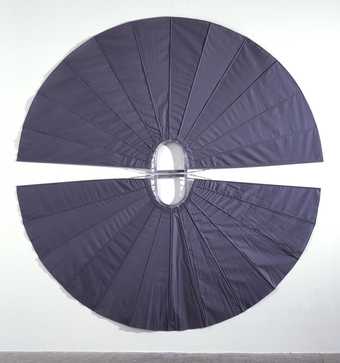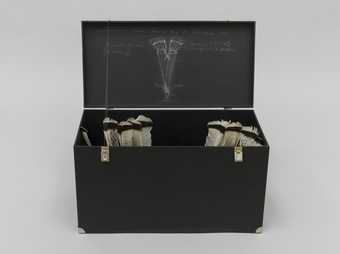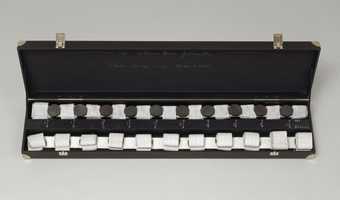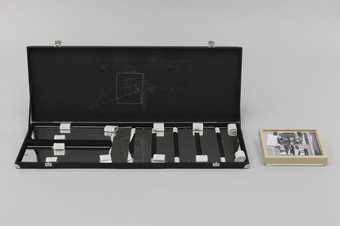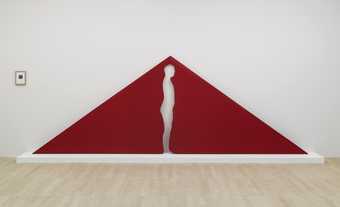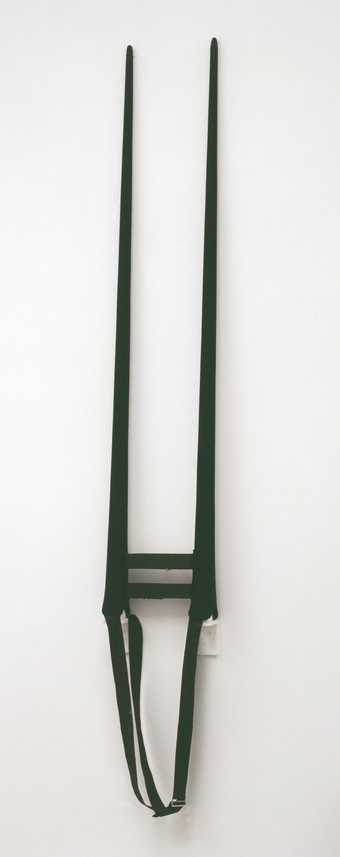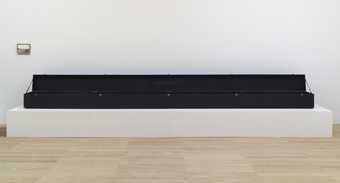
- Artist
- Rebecca Horn born 1944
- Medium
- Piano, hydraulic rams and compressor
- Dimensions
- Unconfirmed: 1500 × 1060 × 1555 mm
- Collection
- Tate
- Acquisition
- Purchased with assistance from the Art Fund and the Friends of the Tate Gallery 1999
- Reference
- T07517
Summary
A grand piano is suspended upside down from the ceiling by heavy wires attached to its legs. It hangs solidly yet precariously in mid-air, out of reach of a performer, high above the gallery floor.
A mechanism within the piano is timed to go off every two to three minutes, thrusting the keys out of the keyboard in a cacophonous shudder. The keys, ordinarily the point of tactile contact with the instrument, fan disarmingly out into space. At the same time, the piano’s lid falls open to reveal the instrument’s harp-like interior, the strings reverberating at random. This unexpected, violent act is followed between one and two minutes later by a retraction as the lid closes and the keys slide back into place, tunelessly creaking as they go. Over time, the piano repeats the cycle. A mounting tension to the moment of release is followed by a slow retreat to stasis as the piano closes itself up like a snail withdrawing into its shell.
Concert for Anarchy is one of a series of mechanised sculptures Horn began making in the late 1970s. Dancing tables, a suitcase trying in vain to climb a pole, startled hammers pecking against their reflections: machines that mimic the mechanisms of desire, they betray the longings beneath the surface of everyday things. Often erotically charged, these works express anthropomorphic anxiety and sensuality.
Horn’s work is truly interdisciplinary. In addition to sculptures and installations her practice has included performance, painting, writing and filmmaking. Before it was adapted to make Concert for Anarchy, this piano was used as a prop in her film Buster’s Bedroom, 1990 (Tate T11851) set in a California mental asylum. Horn has described how, ‘having freed itself from the psychiatric clinic, [the piano] is now composing its own music, developing a new tonality’ (Rebecca Horn: The Glance of Infinity, p.250).
Horn takes the piano away from its normal setting, right side up, in a concert hall or indeed sanatorium, and gives it the means to create its own discordant recital. Its performance is visual and aural and introduces an element of delay to the full experience of the artwork. Horn has stated her intention that this work should ‘trigger a new form of interaction with the visitors of an exhibition’ (Rebecca Horn: The Glance of Infinity, p.15).
Horn is one of a generation of German artists who came to international prominence in the 1980s. While her work is indebted to Surrealism, particularly Meret Oppenheim’s fetishistic objects, Horn’s desiring automatons provide a feminine response to both Marcel Duchamp’s bachelor machines (see The Bride Stripped Bare by her Bachelors, Even (The Large Glass), 1915-23, Tate T02011) and the kinetic art of Jean Tinguely (see Metamechanical Sculpture with Tripod, 1954, Tate T03823). There are also strong links between Horn’s work at that of Louise Bourgeois (see Cell (Eyes and Mirrors),1989-93, Tate T06899) who hints at a similar mix of eroticism and violence in her emotionally potent installations.
Further reading:
Germano Celant, Bruce W. Ferguson, Heiner Müller, Elizabeth A.T. Smith and Rebecca Horn, Rebecca Horn: Diving through Buster’s Bedroom, exhibition catalogue, Museum of Contemporary Art, Los Angeles 1990.
Guiliana Bruno, Germano Celant, Stuart Morgan, Katharina Schmidt, Nancy Spector and Rebecca Horn, Rebecca Horn, exhibition catalogue, Guggenheim Museum, New York 1993, reproduced no.74 in colour.
Carsten Ahrens, Lynne Cooke, Doris van Drathen, Bruce W. Ferguson, Carl Haenlein, Katharina Schmidt and Rebecca Horn, Rebecca Horn: The Glance of Infinity, Hanover 1997, reproduced no.135 (detail), 136, 140 and 142 in colour.
Rachel Taylor
July 2003
Does this text contain inaccurate information or language that you feel we should improve or change? We would like to hear from you.
Display caption
This upside-down grand piano occasionally comes to life in a noisy outburst. The instrument was used as a prop in Horn’s feature film Buster’s Bedroom 1990, set in a psychiatric clinic. Horn has described how, ‘having freed itself from the psychiatric clinic, [the piano] is now composing its own music’. The piano acts like a living thing: it gets upset and slowly regains its composure. This might mirror our own experience of being startled by the sculpture.
Horn’s machines often appear to act like living creatures. She has compared their behaviours to those of human beings: ‘They react as we react. My machines are not washing machines or cars. They have a human quality and they must change. They get nervous and must stop sometimes. If a machine stops, it doesn’t mean it’s broken. It’s just tired. The tragic or melancholic aspect of machines is very important to me. I don’t want them to run forever. It’s part of their life that they stop and faint.’
Gallery label, May 2019
Does this text contain inaccurate information or language that you feel we should improve or change? We would like to hear from you.
Explore
- emotions, concepts and ideas(16,416)
-
- formal qualities(12,454)
- universal concepts(6,387)
-
- humour(1,441)
- illogicality(17)
- sound(54)
- music and entertainment(2,331)
-
- music(916)
- fine arts and music(3,982)
-
- instrument, piano(138)

